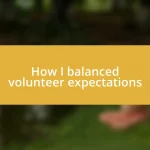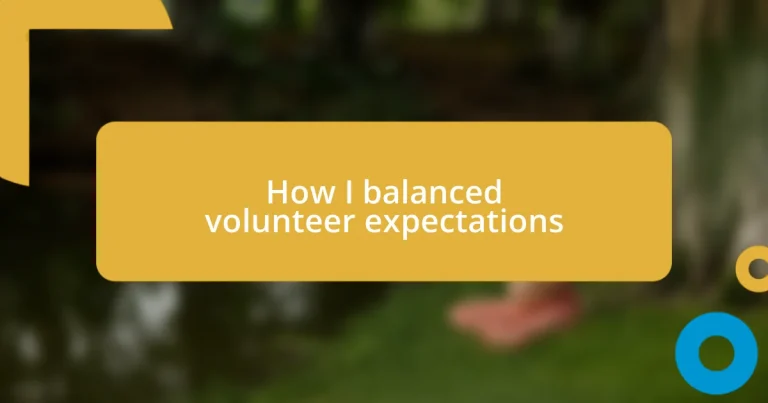Key takeaways:
- Understanding volunteer expectations through clear communication fosters a supportive environment and enhances commitment.
- Regularly evaluating personal capacity and adjusting commitments helps volunteers maintain balance and prevent burnout.
- Celebrating achievements and providing feedback nurtures camaraderie and encourages growth within the volunteer team.
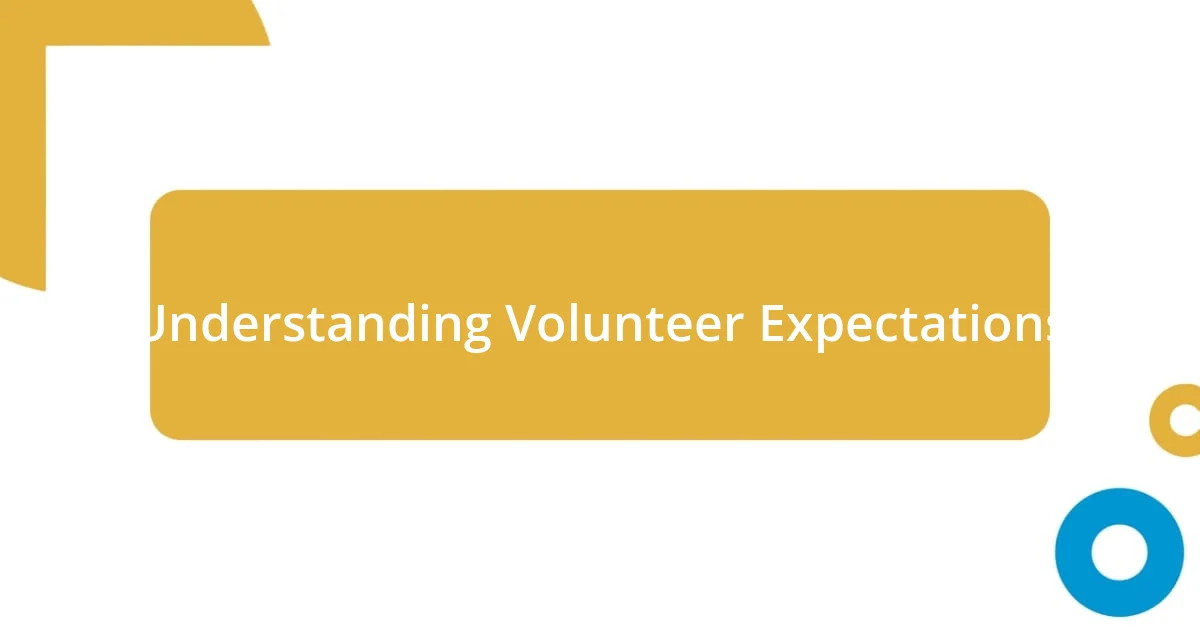
Understanding Volunteer Expectations
Understanding what volunteers expect can be a game-changer in creating a positive experience for everyone involved. When I first started volunteering, I was surprised by how different my expectations were from the organization’s. I wanted to make a meaningful impact, but I quickly learned that that often meant navigating the realities of the group’s limitations and resources. Have you ever felt that spark of enthusiasm only to face unexpected challenges?
One key expectation that many volunteers share is a sense of purpose and connection to the cause. I remember working on a community garden project where the excitement was palpable. Everyone was there, not just to plant seeds, but to foster relationships and bond over a shared vision. When these connections are nurtured, it fuels motivation and inspires long-term commitment — which is what I always strive for.
At the heart of understanding volunteer expectations lies clear communication. I can’t emphasize enough how important it is to keep those lines open. After a particularly frustrating day of confusion about tasks, I realized the value of asking questions upfront. Setting clear roles and responsibilities not only reduces anxiety but reinforces trust. Have you found clarity in your volunteer experiences? When both sides understand each other’s needs, that’s when the magic really happens.
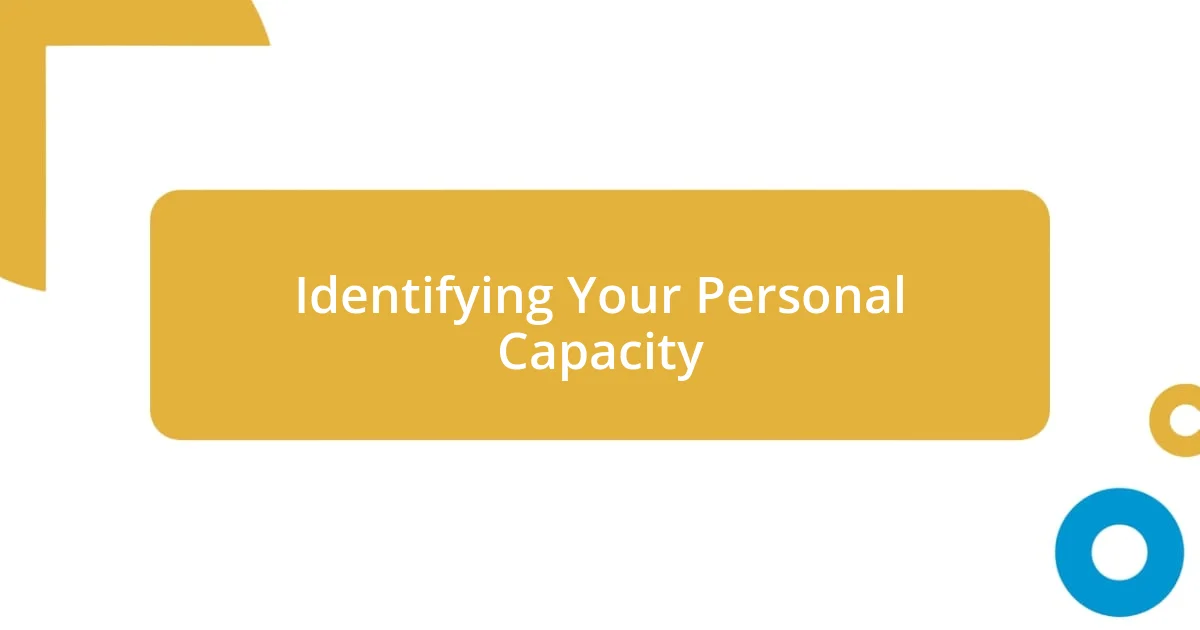
Identifying Your Personal Capacity
Identifying your personal capacity when it comes to volunteering is crucial. I’ve faced moments where my enthusiasm led me to overcommit, thinking I could juggle everything perfectly. The reality hit hard when I realized my energy levels couldn’t keep pace with my ambitions. It’s essential to assess how much time and emotional energy you can realistically offer before diving in headfirst.
Reflecting on past experiences often helps in gauging your personal capacity. For instance, I once volunteered for an event that required a considerable time investment. I vividly remember feeling overwhelmed as the event date approached. It was a valuable lesson in understanding my limits, helping me recognize that sometimes it’s okay to say no to additional responsibilities to maintain balance.
Creating a proactive approach towards this involves weekly self-check-ins. I like to evaluate my schedule, priorities, and how I’m feeling emotionally. Have you tried this method? I find these moments of reflection guide me in deciding whether I can commit to another project without feeling stretched too thin.
| Personal Capacity Factors | Implications |
|---|---|
| Time Availability | Can you commit a few hours each week without feeling rushed? |
| Energy Levels | Are you physically and emotionally ready for the demands of volunteering? |
| Current Commitments | How do your job and personal life responsibilities fit into your volunteering? |
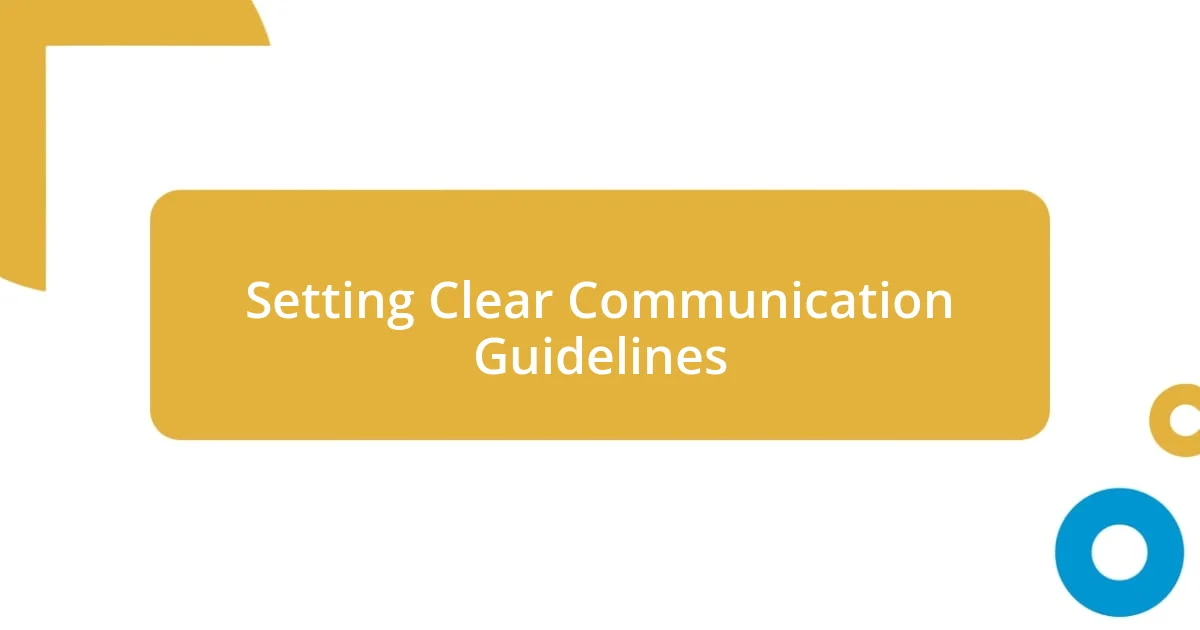
Setting Clear Communication Guidelines
Setting clear communication guidelines is something I genuinely believe can make or break a volunteer experience. In my early days of volunteering, I faced challenges due to unclear communication, which often led to frustration. I remember working with a team where everyone had different interpretations of our tasks. If I had known how crucial it was to establish these guidelines upfront, I could have avoided that unnecessary chaos.
Here are some effective strategies to set clear communication guidelines:
- Define Roles Early: Ensure everyone knows their responsibilities to prevent overlap and confusion.
- Create a Communication Plan: Decide how and when you’ll communicate (e.g., weekly check-ins, group chats).
- Encourage Feedback: Regularly ask for input from volunteers to foster an open dialogue and improve processes.
- Stick to a Schedule: Establish deadlines for tasks and updates so that everyone stays on the same page.
- Use Simple Language: Avoid jargon to ensure everyone understands what’s being asked or discussed.
During a recent project, I initiated a weekly meeting with my team to discuss our progress. This simple practice not only kept us aligned but also strengthened our relationships. Seeing my team’s anxiety transform into confidence when we had shared clarity was such a rewarding experience. Have you ever noticed how much smoother things go when everyone is in sync?
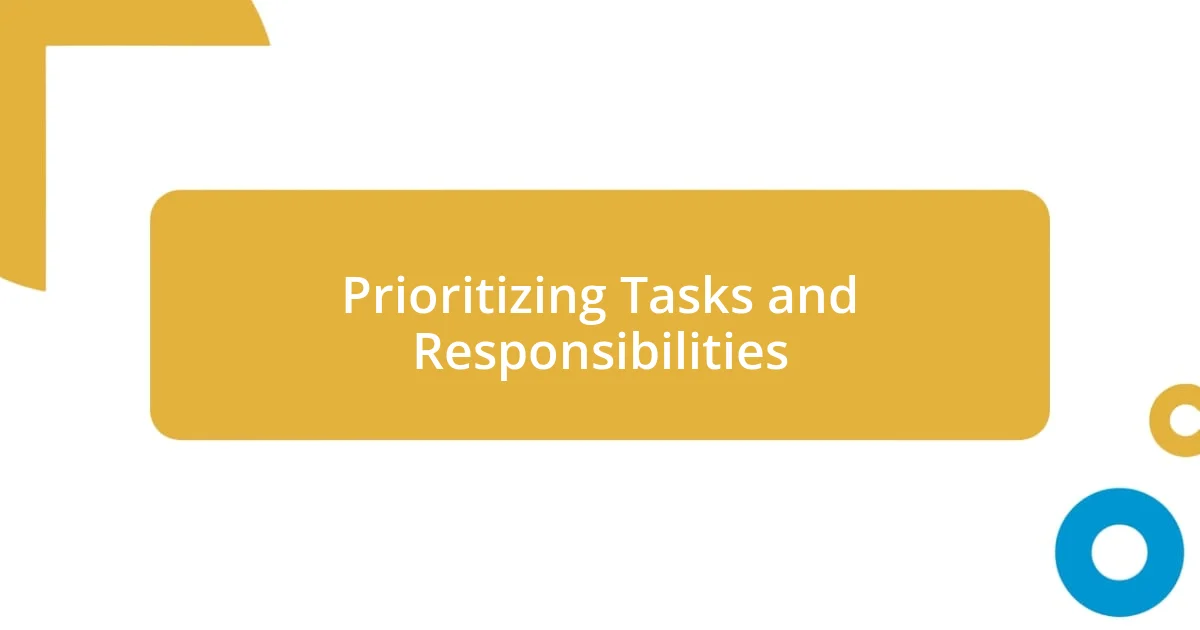
Prioritizing Tasks and Responsibilities
It’s easy to feel overwhelmed when juggling various tasks. One effective technique I’ve found is creating a priority matrix, where tasks are classified by urgency and importance. During a busy month, I used this method to realize that some activities I considered essential were actually low priority. By focusing on what truly mattered, I felt more accomplished and less stressed.
I believe that regularly revisiting and adjusting my priorities keeps me grounded. For example, during a recent volunteering campaign, I was initially excited about every aspect. Yet, I discovered that my time was better spent on strategy rather than nitty-gritty details. This shift not only enhanced my contributions but also allowed me to mentor new volunteers, a role I found deeply fulfilling.
Have you ever experienced that moment when everything seems urgent? I certainly have. I learned the hard way that saying “yes” to everything doesn’t equate to effectiveness. By recognizing that I can delegate certain tasks, I made my volunteer experience far more enjoyable. It’s about balance, and finding it has enriched my journey in volunteering immensely.
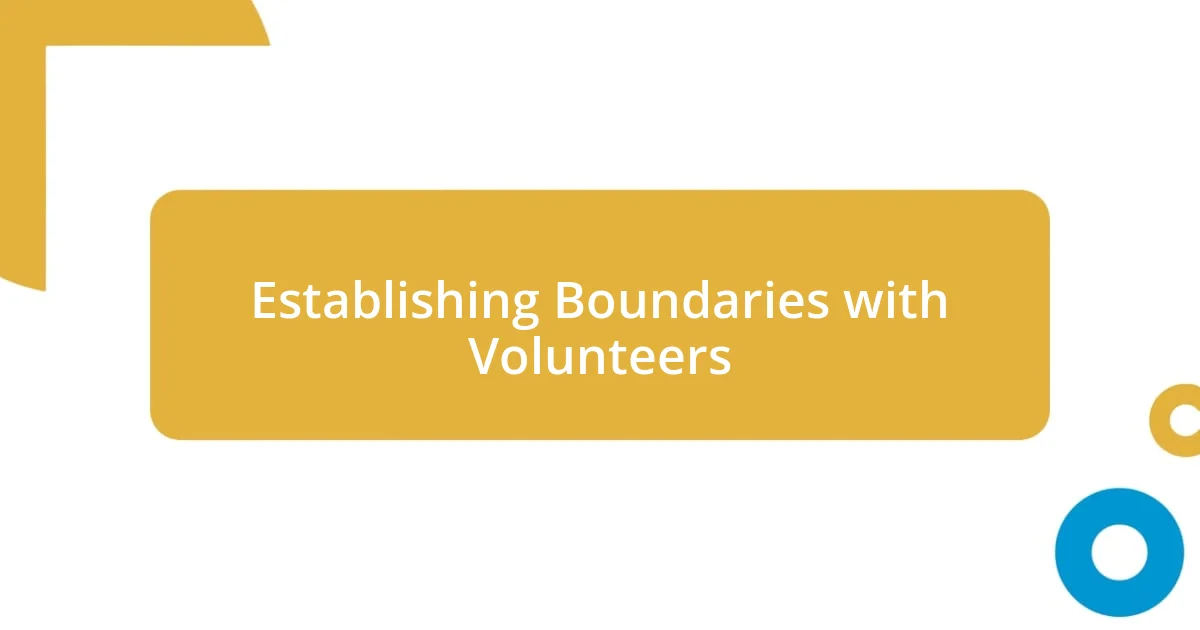
Establishing Boundaries with Volunteers
Establishing boundaries with volunteers is essential to maintain a positive and productive environment. In my experience, I discovered that without proper boundaries, roles can blur, leading to misunderstandings. I once participated in a community project where I found myself taking on more responsibilities than I initially agreed to. It was overwhelming, and that experience taught me the importance of clearly defining what I could and couldn’t commit to from the outset.
One effective approach I’ve used is creating a mutual agreement outlining expectations from both sides. This not only encourages accountability but also serves as a gentle reminder of why we’re there together. I remember drafting a simple document with a fellow volunteer, and the sense of clarity it provided was remarkable. It felt great to know we were on the same page, and it relieved so much pressure, allowing us to focus on our shared goals. Have you found yourself in a similar situation, where expectations were unclear? That clarity can be a game changer.
I’ve also found that regularly checking in about our boundaries can prevent any potential resentment. Just the other week, I sat down with my volunteer team and asked how everyone felt about their roles. The open dialogue revealed that a few of us had different interpretations of our tasks, and addressing this early on made all the difference. I believe that fostering an environment where we can speak up not only strengthens our teamwork but deepens our connections. After all, isn’t volunteering supposed to be about collaboration and growth together?
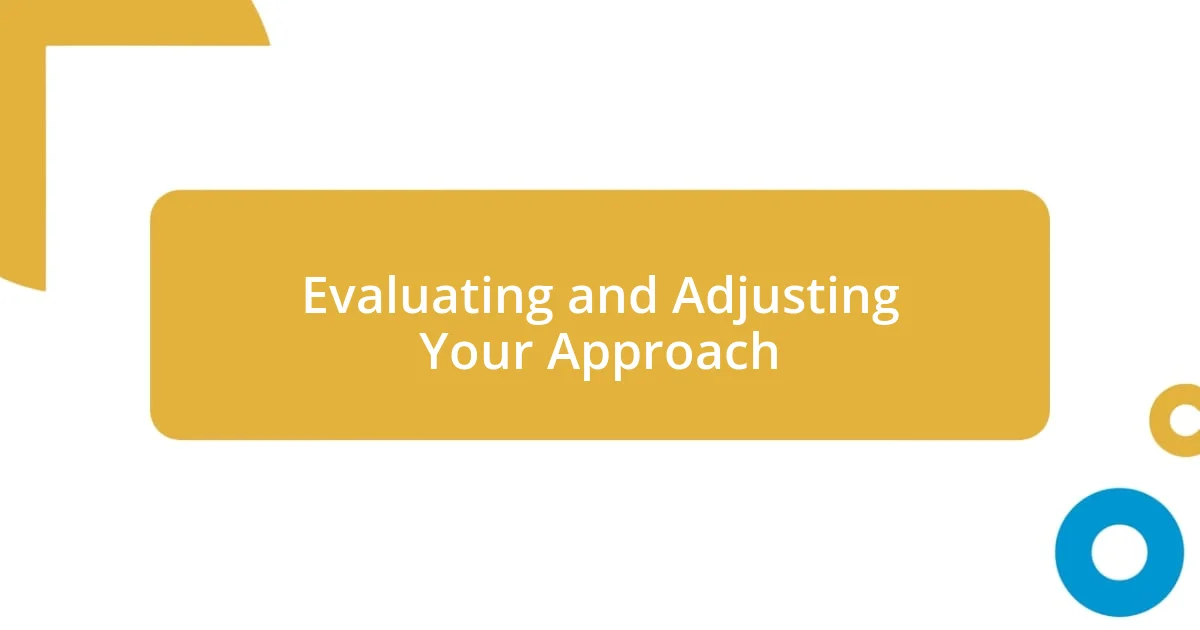
Evaluating and Adjusting Your Approach
Evaluating and adjusting your approach is essential for a rewarding volunteer experience. I recall a time when I felt like I was pulling in every direction, trying to meet every request. It became clear that I needed to assess my commitments critically. I started by reflecting on what was genuinely exciting for me and where I could make the most impact. This evaluation led to some surprising realizations that reshaped my approach.
Sometimes, I think we forget to ask ourselves if our volunteer roles are still aligning with our passions and skills. I made it a habit to review my contributions after each project. For instance, after organizing a fundraising event, I evaluated not just the outcome but also my enjoyment during the process. This introspection helped me recognize that while I loved planning, I found the execution exhausting. By adjusting my role to focus more on brainstorming and less on logistics, I was reinvigorated. Have you ever paused to consider if you’re truly enjoying what you’re doing?
I actively engage with my fellow volunteers to gauge how they feel about their experiences too. Recently, during a debriefing session, I encouraged everyone to share feedback on what worked and what didn’t. It was enlightening to hear different perspectives, and it reassured me that I wasn’t alone in feeling the need for change. It taught me that evaluating our approach isn’t just about personal reflection; it’s also about communal growth and adaptability. How often do you check in with yourself and your team about the effectiveness of your efforts? Regular conversations can lead to not only better outcomes but also a more cohesive and motivated group.
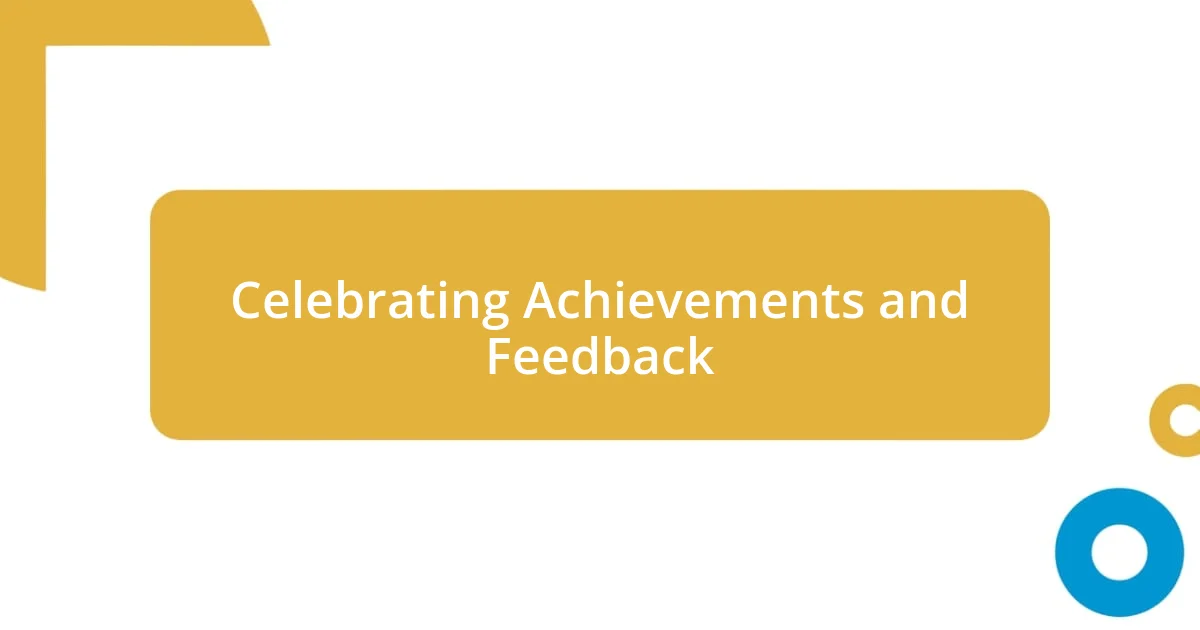
Celebrating Achievements and Feedback
Celebrating milestones, big or small, can greatly enhance the sense of fulfillment we derive from volunteer work. I remember completing a habitat restoration project and how we all gathered for a small celebration afterward. Sharing our individual contributions and appreciating each other’s efforts created a wonderful atmosphere of camaraderie. It was a simple gesture, but acknowledging what we’d achieved together made us feel valued and connected. Have you ever experienced such moments where a little celebration turned a project into a cherished memory?
Feedback plays a crucial role in our personal and collective growth. In one instance, after a successful community outreach event, I sent out a brief survey to my team, asking for their thoughts on what went well and what could be improved. The responses were not only enlightening but also highlighted strengths I hadn’t recognized in myself or others. Reflecting on this collective feedback truly empowered us, fostering an environment where everyone felt encouraged to share openly. Don’t you think that inviting feedback transforms the way we see our contributions?
Moreover, I’ve found that recognizing individual efforts can create a ripple effect of motivation. I once made it a point to personally thank a volunteer who consistently went above and beyond, and we could see her enthusiasm lift the whole team. Hearing a simple “thank you” can significantly boost morale and inspire others to strive for their best. How do you celebrate your team’s achievements, and what impact does it have on the group’s dynamic? In my experience, celebration and feedback are not just about looking back; they are powerful tools for propelling us forward.



